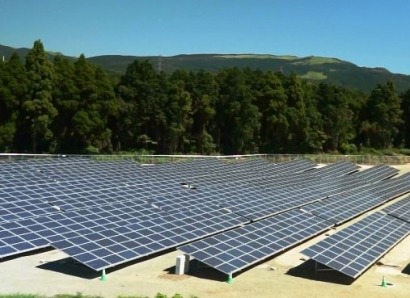
The 1.1 MW project, the JV's third, is expected to produce 1,375,000 kilowatt hours (kWh) of climate-friendly electricity a year – enough for more than 380 local households.
The project was built at the behest of a local company.
“Our customer for the first juwi project in Japan was very satisfied with our work. He recommended us to other local investors - which is how we won the project in Ozu” said Juan Mas Valor, Managing Director of juwi Shizen Energy.
Before construction works could begin, certain obstacles had to be overcome – the land had previously been used as a pig farm but had been deserted for over 30 years and therefore had to be cleared of vegetation.
In addition, the project team unexpectedly hit upon concrete foundations of the former pig stalls as there were no plans of the previous farm. They could, however, be reused as new foundations for the mounting system. After that, construction progressed rapidly and the plant was connected to grid as on schedule.
For juwi Shizen Energy it is the third solar project on Kyushu island. The company’s first project, a solar power plant with an installed capacity of one MW, already produces clean electricity for 300 local households.
juwi Shizen Energy also constructed utility scale roof top photovoltaic (PV) systems. In Kumamoto the company recently connected the rooftop PV plant „Bear 2” to the grid. The system consists of 4,088 solar modules and was erected within only four weeks.
It has a capacity of 1 MW and produces one million kilowatt hours (kWh) of clean energy per year; enough to supply 300 local households. The PV plant was built for the same investor who previously financed juwi Shizen’s first solar project.
“Japan is a fantastic market for solar energy and our Japanese team has built great trust with local authorities, land owners and investors”, said Amiram Roth-Deblon, juwi Regional Director Asia Pacific and Representative Director of juwi Shizen Energy.
The country is currently dramatically expanding its renewable energy sector. Japan is aiming for 20 percent renewables in 2020. Therefore, the land of the rising sun has introduced the world’s highest feed-in tariff for solar power. According to experts, Japan is now one of only five countries that have achieved 10 gigawatts of cumulative solar photovoltaic capacity. The country’s PV market in Japan broke the 10 GW barrier in August of this year and reached 10.5 GW at the end of August.
“juwi Shizen Energy has a well filled project pipeline und will make a huge contribution to Japan’s transition towards a sustainable economy”, Amiram Roth-Deblon said.
For additional information:

